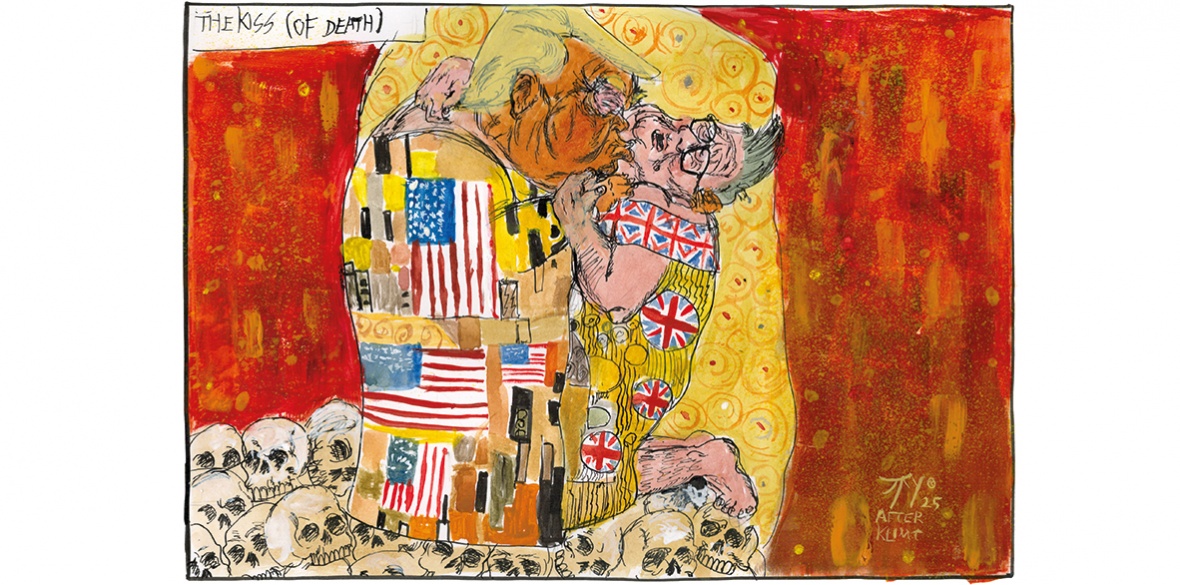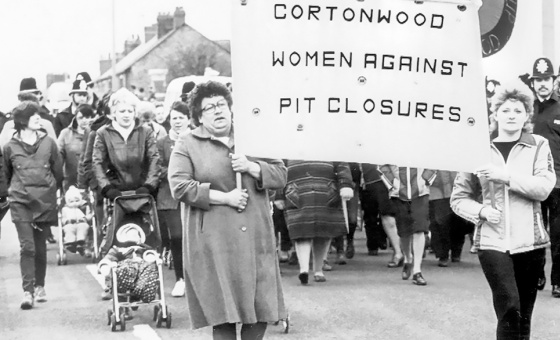This is the last article you can read this month
You can read more article this month
You can read more articles this month
Sorry your limit is up for this month
Reset on:
Please help support the Morning Star by subscribing here
BRITISH Prime Minister Keir Starmer met US President Donald Trump. An opportunity to stand up to the US president’s presidential actions and more or less unhinged statements and remarks that he missed.
The British PM had announced huge cuts to Britain’s aid budget two days before meeting Trump, to enable him to increase defence spending as well as to please the US president, who had demanded that Nato-members spend more on defence.
“The US is our most important bilateral alliance … So this week when I meet President Trump, I will be clear. I want this relationship to go from strength to strength,” Starmer had told the House of Commons.
‘True friends’ who got along ‘famously’
At the meeting with Trump on Thursday, Starmer thanked Trump for his leadership, and told him that Britain and the US “stand side by side still” and have a lot in common. The Prime Minister also insisted that “it is good to know that Britain has a true friend in the Oval Office,” that “this relationship matters more than ever” and that the two countries will “work together” to deliver “big economic wins.”
Starmer also had an invitation from King Charles with him, for “an unprecedented second state visit.”
Trump, for his part, called Starmer “a special man” and said that “we get along very famously,” even though Starmer was a “tough negotiator.” But the PM initially failed to secure any real concessions over Ukraine or tariffs on Britain. “He tried. We’ll see. We could very well end up with a real trade deal where the tariffs wouldn’t be necessary,” Trump told the press.
A lot to criticise
So not a lot of takings for biting his tongue. Because Starmer could have criticised anything from Trump’s withdrawing from the Paris Agreement and the World Health Organisation, siding with Russia at the UN security council and imposing sanctions on the International Criminal Court to Trump’s rhetoric and actions in regard to Gaza, freezing US aid to South Africa, removing AI safeguards, restoring the death penalty as “an essential tool,” threatening multiple countries with tariffs, threatening US allies and his statements about Ukraine.
The German chancellor-in-waiting, Friedrich Merz, who is known as an Atlanticist, spoke about achieving “independence from the US” after his election victory.
Starmer could have said something similar, or done as the fictitious Prime Minister David did in the 2003 romcom, Love Actually, and remonstrated with the US president:
“A friend who bullies us is no longer a friend. And since bullies only respond to strength, from now onward I will be prepared to be much stronger,” Hugh Grant’s character said to the equally fictitious US president played by Billy Bob Thornton.
Instead, Starmer appeared to follow in the footsteps of his predecessor, Tony Blair, who was likened to a lapdog or poodle for the way US president George W Bush addressed him at a summit in 2006, as well as Blair’s tendency to say “yes” to Bush — not least in regard to British illegal involvement in the Iraq war.
‘Tyrant,’ ‘threat,’ ‘repugnant’
But it is time for the Labour government to tell the truth about Trump, as strength and unambiguity are the only language he understands. Several Labour MPs have after all spoken their minds before.
Starmer’s Foreign Secretary David Lammy, who was with the PM in Washington, had called Trump a “tyrant in a toupee,” “a woman-hating, neonazi-sympathising sociopath” as well as “a profound threat to the international order” in 2018.
And Starmer himself had called comments by Trump about Mexican immigrants “offensive” and “absolutely repugnant” in 2016 when he was shadow home secretary. “Of course, I would not want to have Donald Trump round for dinner to express his views,” Starmer had added.
Stick to our principles
Other parties’ MPs have been more than willing to criticise both Starmer’s frantic attempts to shore up our so-called “special relationship” with the US and to suggest that the PM speaks the truth to Trump.
“Instead of frantically scrabbling to shore up the so-called ‘special relationship’ between Britain and the US, I think many people would rather our leaders stuck by their principles — and used this moment as an opportunity to rethink our global relationships,” Green Party co-leader and MP Carla Denyer wrote in January.
Tory leader Kemi Badenoch recently said that she would have no problem “speaking the truth” to Trump “if needs be.” And Tory MP Neil Hudson had urged Starmer to invoke the spirit of Winston Churchill when he went to the US at PMQs in the House on Wednesday.
But it was Churchill who had coined the term “special relationship” in a speech in the US in 1946 to describe two “kindred systems of society” — something that is increasingly no longer the case, or at least shouldn’t be.
New politics
In George Orwell’s 1984 the British Isles are called Airstrip One and have been absorbed into the US as part of an Oceania, whose slogan is “War is peace. Freedom is slavery. Ignorance is strength” — an authoritarian notion of constant war, conformity and controlled information.
It will surely take quite a dose of doublethink to successfully land Trump’s actions and worldview on the British Isles. But Nigel Farage’s simultaneous embrace of Trumpism and surge in the polls shows it is not impossible.
Not least because the resurgent radicalised right appears to be better at articulating the fragility of liberal democratic societies and how they create losers, than the political centrists and the left.
They are seemingly trying to change our societies into what JG Ballard in his 2006 novel, Kingdom Come, called “the new politics,” based on “people’s dreams and needs, their hopes and fears,” a sort of “consumer fascism” that “provides its own ideology,” where the politicians give the public what they want.
Seems a pretty good analogy for today’s political climate. A climate that will persist and grow, unless we present a more moral, fact-based and inclusive vision and worldview that can stand in its stead, while simultaneously creating actual and fundamental positive change that is felt across the board.
And to do this, we must first stand up to those who seek to erode democracy and equality, such as Trump and Elon Musk.









